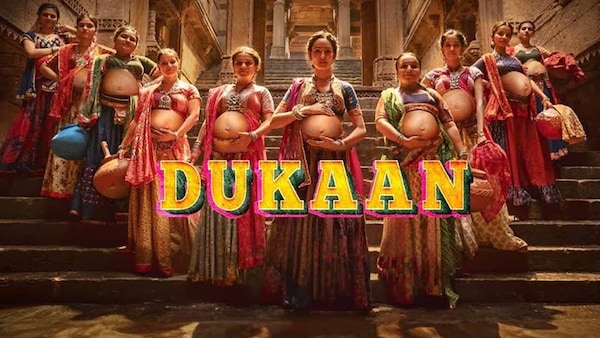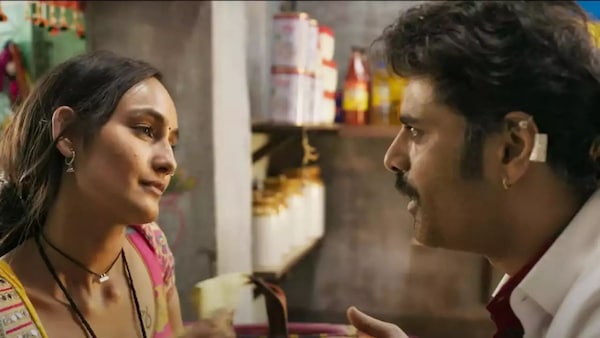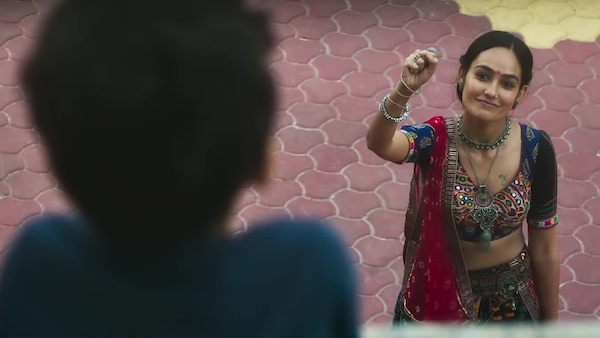Dukaan: The Year’s Worst Film Is Possibly Here
Dukaan centres on surrogacy, but unfolds as a cautionary tale on how not to make a film

Last Updated: 05.05 PM, Apr 06, 2024
HERE are some things I remember from watching Siddharth Singh and Garima Wahal’s Dukaan: a series of pregnant women with identical rotund stomachs like they have been created by AI; time passing faster than the speed of light – one moment I look down to eat popcorn and in the next a kid is born, he has grown up and his mother has already abandoned him; a very disinterested Sunny Deol appearing out of nowhere and saying something about family and his hand; a very interested man sitting behind me and screaming, “oh shit” every time a pregnant woman screamed in pain on the hospital bed.
Let me come clean at this point and admit that I do not remember Siddharth and Garima’s film as much as moments from it are seared into my brain. Dukaan, the directorial debut of the duo known for their association with Sanjay Leela Bhansali (they were writers on Goliyon Ki Raasleela Ram-Leela), centres on surrogacy but unfolds as a cautionary tale on how not to make a film. It is so uniformly bad and unwatchable that the few times it evokes reaction is when it gets worse and plummets to depths I did not imagine were possible.

It is not so much the non-committal storytelling but the hogwash filmmaking that foretells Dukaan’s doom. No, a doctor telling a pregnant woman in labour, “push kar” cannot cut to a station called “Pushkar”; the sight of water-filled earthen pot breaking cannot transition to the image of water breaking in pregnancy; a person cannot look the same in a film that is supposed to be sweeping across decades and no, you make a film which is headlined by a woman and infuse her with one solitary characteristic: feisty.
I am certain these are not inscribed as filmmaking rules in any book but while watching Dukaan I secretly hoped for the existence of one if only to make the experience of those watching films less painful… to prevent those sitting before the screen from spiralling into some existential rabbit hole; because, after questioning why the filmmakers chose to make Dukaan, I transitioned to questioning the purpose of my existence, and am still waiting for an answer.

Levity aside, Dukaan is a worryingly bad film that unravels with incredibly bad taste and reduces the sensitive theme of surrogacy to a bad joke. I am aware that I have used the word ‘bad’ three times in one sentence but it says more about the film that it does not feel enough. Siddharth and Garima posit their story in Anand, the city in Gujarat; design the protagonist Jasmine Patel (Monika Panwar, who was last seen in the wonderful Mast Mein Rehne Ka) as a Bhansali heroine on steroids; and outline an excruciatingly tiresome tale of a surrogate mother developing feelings for a child and then engaging in a mindless duel of sorts with the biological parents.
The makers include an earthquake (poor Sikandar Kher makes a brief appearance), a child who is quickly forgotten, and a child who is not, to arrive at the conclusion that surrogate mothers should be given the respect they deserve. If this messaging was distilled to a TVC, the world would have still remained the place it was, but I for one would have been happier.

Let’s delve deeper: Jasmine, as women in Hindi films tend to be, is a rebel. She rages against her abusive father, arranges her own wedding with a much older man (Kher), and solemnly swears to never have a child. But, as it tends to happen with women in Hindi films, her will is overturned. She conceives but has no maternal feelings. Years pass in the blink of an eye. She needs to earn money and like most women in the neighbourhood, Jasmine agrees to be a surrogate mother, and she is a success. She refers to herself as a ‘child-bearing machine’ and achieves great success till she decides to retire. Enter a wealthy couple, Diya and Armaan (Monali Thakur and Soham Majumdar – both perpetually looking like there has been a tragedy at home) and some knife-holding threatening later (I can’t), Jasmine agrees to become a mother one more time.
By the time Dukaan reaches here, it already feels like three films in one — the story of a rebellious woman, the story of a woman who does not want to become a mother, and the story of a child with an absent mother. It also feels painfully long. Siddharth and Garima introduce some bonkers plot segues (Jasmine becomes a hippie after running away with the child), some insane shots (after losing her husband, Jasmine stands at the riverside like a Bengali woman shooting for a homegrown sari brand), and ensure enough mud is thrown on both sides.

After absconding with the child for four years, Jasmine is arrested. Diya and Armaan reunite with their son and rename him from Jamaal to Diyaman (I really can’t). Jasmine comes back and is ridiculed for getting in touch. They tell her she has no money, no social standing that could help the child in the future. In return, our heroine gives it back to them by saying that women who can’t be mothers are forced to come to women like her to feel complete. There is really no winning here. Except little Jamaal aka Diyaman who gained my respect during the runtime for refusing to engage in this madness without shying away from expressing his feelings. When Jasmine comes back from jail and meets him, he wears a t-shirt that says ‘good times’ — possibly denoting his new-found rich status. Later, when things are resolved, he wears another t-shirt that says, ‘yes, happy’. There is great wisdom here; if only Dukaan exercised such restraint.
The views expressed in this column are those of the author and do not necessarily reflect the official policy or position of OTTplay. The author is solely responsible for any claims arising out of the content of this column.
